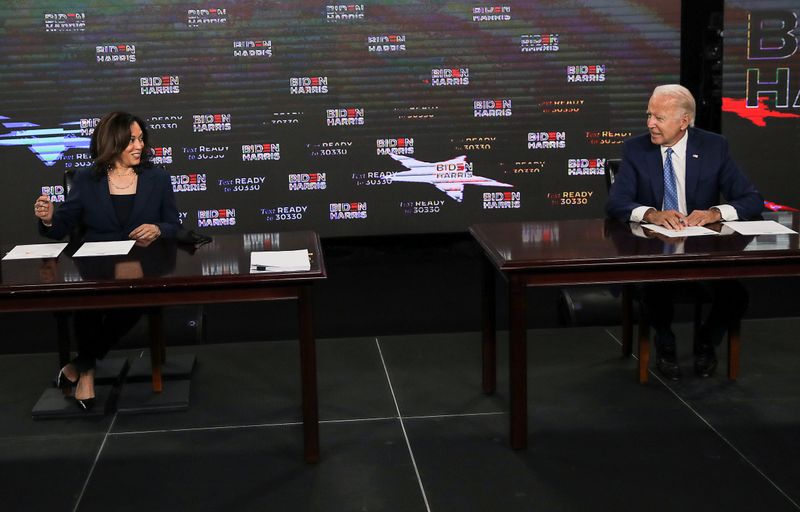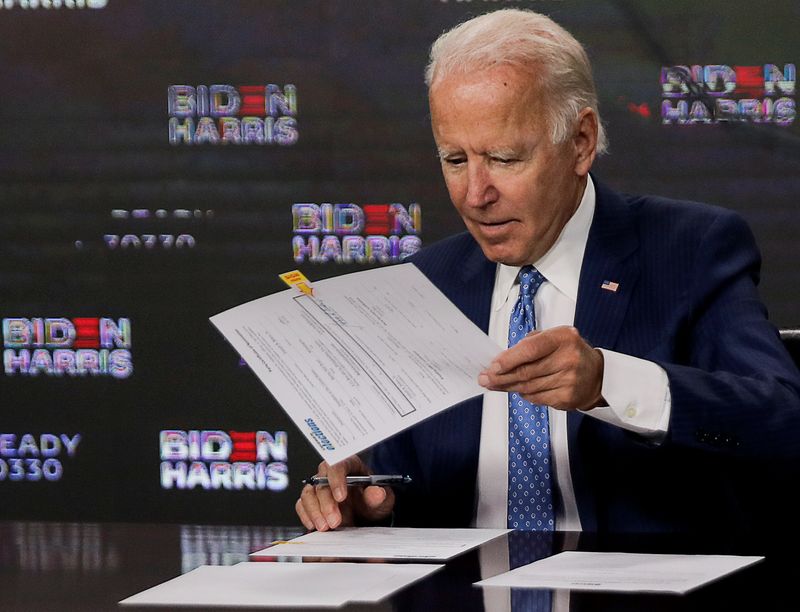By James Oliphant
WASHINGTON (Reuters) - With fewer than 80 days to go before the U.S. presidential election, it looks like Joe Biden's race to lose.
Yet, as Democrats nationwide gather online this week to nominate him as their party's choice to challenge President Donald Trump on Nov. 3, many fear Biden may just do that - for factors almost entirely out of his control.
The former vice president and his allies have every reason to feel bullish. Polls show Biden has built an expansive lead in nearly every battleground state that Trump won narrowly in 2016, as the Republican's approval numbers tumble amid the coronavirus pandemic. For the first time in a decade, retaking the Senate - and full control of Congress - is within sight.
Yet interviews with more than a dozen Democratic officials, activists and voters reveal deep anxieties that Trump will make voting as difficult as possible during the pandemic, and should he lose the vote, he won't accept its outcome.
Biden himself has called it his biggest fear. Former President Barack Obama sounded the alarm on Friday, saying on Twitter the Trump administration is "more concerned with suppressing the vote than suppressing a virus." And eight of 10 Democrats are concerned about voter suppression, according to a Reuters/Ipsos poll in late July.
Trump has railed against voting by mail for months, proclaiming without evidence that it will lead to fraud, and on Thursday all but acknowledged he was blocking Democratic demands for additional funding for the post office because of his opposition to mail-in voting.
"We can't predict what's going to happen other than the closer we get to the election, the more desperate Trump and his campaign will become," said Rodell Mollineau, an adviser to Unite the Country, a political action committee that backs Biden.
Tim Murtaugh, a spokesman for the Trump campaign, said the president wants a "free and fair" election, adding that it is Democrats who are inviting "chaos and the very real possibility of fraud" by trying to expand voting by mail.
Democrats and voting rights groups say mail-in voting can help protect voters from the coronavirus, and that a failure to guarantee that option during the pandemic will disenfranchise millions of Americans, especially the poor and African-Americans who tend to vote Democratic.
Some say Biden's commanding edge in the polls only makes them more nervous. They worry that increasing cases of COVID-19 could keep voters away from polling places, particularly if Biden is perceived as coasting to an easy win.
"If Biden is up by 10 points, how likely are you to risk your life to pull that lever," Stefan Smith, who was a top digital strategist for Pete Buttigieg's presidential campaign.
At about this time in 2016, then Democratic presidential nominee Hillary Clinton had around a five-point lead in various polls and still lost the election three months later, partly due to the first decline in African-American turnout in 20 years.
Michigan Democrat Patty Leitzel, who lives in politically divided Macomb County, said she is still traumatized by the win Trump squeaked out in her state four years ago and worries he could do so again - as do the voters she talks to on a regular basis.
Leitzel, who was county chairman for the Clinton campaign, has been phone-banking and organizing virtual house parties on Biden's behalf. "If I had Biden's ear, I would tell him this: Don't follow the polls," she said.
WHAT AUGUST LEAD WILL MEAN
Like most Democrats, Leitzel's biggest concern is voter suppression. But she said she also would like to see Biden make a greater effort to get his message out so that the election hinges less on Trump's performance in office.
Democrats fret that the race has become overly focused on Trump's handling of the pandemic. That has so far worked in Biden's favor, but has also left him vulnerable to a sudden shift in the country's fortunes, such as the economy improving greatly in the run-up to the election or a coronavirus vaccine becoming available, they say.
"These changes could narrow the race," said Geoffrey Skelley, an elections analyst for FiveThirtyEight, a website that analyzes polling data. "Because the president generally polls better in the states that are most likely to decide the election than he does nationally, he doesn't necessarily have to recover that much to improve his chances of winning in the Electoral College."
Murtaugh said Democrats wanted the country to remain in desperate shape through the election. "President Trump looks forward to our continued recovery, but Joe Biden fears it," he said.
Biden has taken a far more cautious stance than Trump on reopening the economy and repeatedly emphasized the need to follow public health guidelines.
He will accept his presidential nomination virtually from his home state of Delaware, while Trump plans visits this week to Minnesota, Wisconsin, Arizona and Pennsylvania, all politically competitive states.
The Biden campaign's on-the-ground efforts have also gone largely digital. The Trump campaign, by contrast, says it is knocking on one million doors a week.
The wisdom of each side's approach won't be known until election day. But Biden allies are keenly aware that a 10-point edge in August does not guarantee a win in November.
At a July 30 fundraiser, Representative Cedric Richmond, a co-chair of Biden's campaign, raised the specter of the Atlanta Falcons, the National Football League team that in 2017 squandered a 25-point lead to lose the championship game.

"We're not going to be up 28 to 3 at halftime at the Super Bowl and watch our lead whittle away," Richmond said. "We're going to keep pressing, and we're going to keep working."
